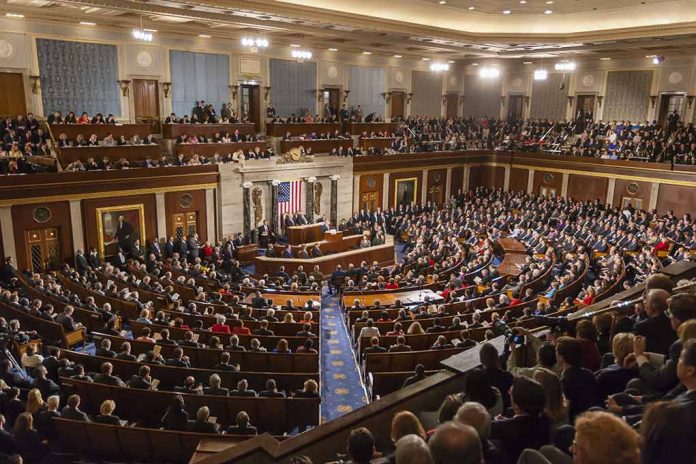
Senate Republicans dealt a decisive blow to efforts aimed at curbing Trump’s tariff powers, with only three GOP members breaking ranks in a dramatic 49-49 tie vote.
Key Takeaways
- Senate Republicans overwhelmingly voted to maintain President Trump’s emergency declaration for tariffs, with Sen. Rand Paul’s resolution to end them failing in a 49-49 tie vote.
- Only Republican Senators Susan Collins and Lisa Murkowski joined Paul in voting against Trump’s trade policies, while Vice President JD Vance cast the tie-breaking vote to table the measure.
- Trump’s declaration claims imports pose an “unusual and extraordinary threat” to national security, though critics argue this expands executive power beyond constitutional limits.
- The vote signals strong Republican alignment with Trump’s trade war tactics despite private reservations expressed by some GOP lawmakers.
Senate Vote Preserves Trump’s Tariff Authority
In a decisive split vote that underscores Republican unity behind former President Trump’s economic agenda, the Senate recently rejected an effort to terminate the national emergency declaration that enables Trump’s wide-ranging tariffs. Senator Rand Paul led the challenge with a resolution that ultimately failed in a 49-49 tie, with Vice President JD Vance casting the decisive vote to preserve the president’s trade policy. Only Republican Senators Susan Collins and Lisa Murkowski joined Paul in breaking ranks with their party.
The resolution aimed to end what critics describe as an abuse of emergency powers. Trump invoked Section 232 of the Trade Expansion Act to impose across-the-board 10 percent tariffs on most U.S. trading partners, claiming foreign imports constitute an “unusual and extraordinary” threat to national security. According to supporters, these measures protect American industries and workers from unfair foreign competition, while opponents argue they raise consumer prices and invite retaliatory actions.
#BREAKING: Senate rejects measure to block Trump tariffs — 49-49 pic.twitter.com/Z2Snx5G0RV
— Backfire (@BackfireBros) April 30, 2025
Constitutional Concerns and Republican Loyalty
Senator Paul made a passionate constitutional case against the emergency declaration, positioning his resolution as a defense of legislative authority rather than simply an economic policy disagreement. Notable absences during the vote included Senate Minority Leader Mitch McConnell, whose office stated he “has been consistent in opposing tariffs and that a trade war is not in the best interest of American households and businesses.” Senator Sheldon Whitehouse also missed the vote, with both senators likely to have supported Paul’s resolution.
Even if the resolution had passed, its practical impact would have faced significant hurdles. Trump had already threatened to veto any measure curtailing his trade authority, and procedural obstacles in the House would have complicated further progress. The vote nonetheless served as a critical test of Congressional willingness to assert authority over trade policy, traditionally a legislative prerogative before recent expansions of executive power.
Signs of Changing Political Dynamics
Despite the resolution’s failure, some political analysts view the close vote as evidence that Trump’s influence over Republican lawmakers may be approaching its zenith. Kent Lassman of the Competitive Enterprise Institute suggested the vote might signal a coming inflection point in executive-legislative relations. “At some point the president will reach the apex of his powers to sway Congress. It is the nature of a term-limited executive,” noted Lassman.
Senator Paul revealed that many of his Republican colleagues privately express disagreement with Trump’s trade policies but remain cautious about opposing him publicly. This dynamic was evidenced in Senator Thom Tillis’s passive stance during interviews, where he declined to take a position against the tariffs. The vote ultimately reinforces Trump’s approach to international trade as the official Republican position, despite economic concerns raised by traditional conservatives about government intervention in markets.
Sources:
Senate GOP leaders succeed in protecting Trump tariffs
Senate Republicans Voted Overwhelmingly To Continue Trump’s Trade War
Senate Rejects Bipartisan Measure to Undo Trump’s Tariffs



